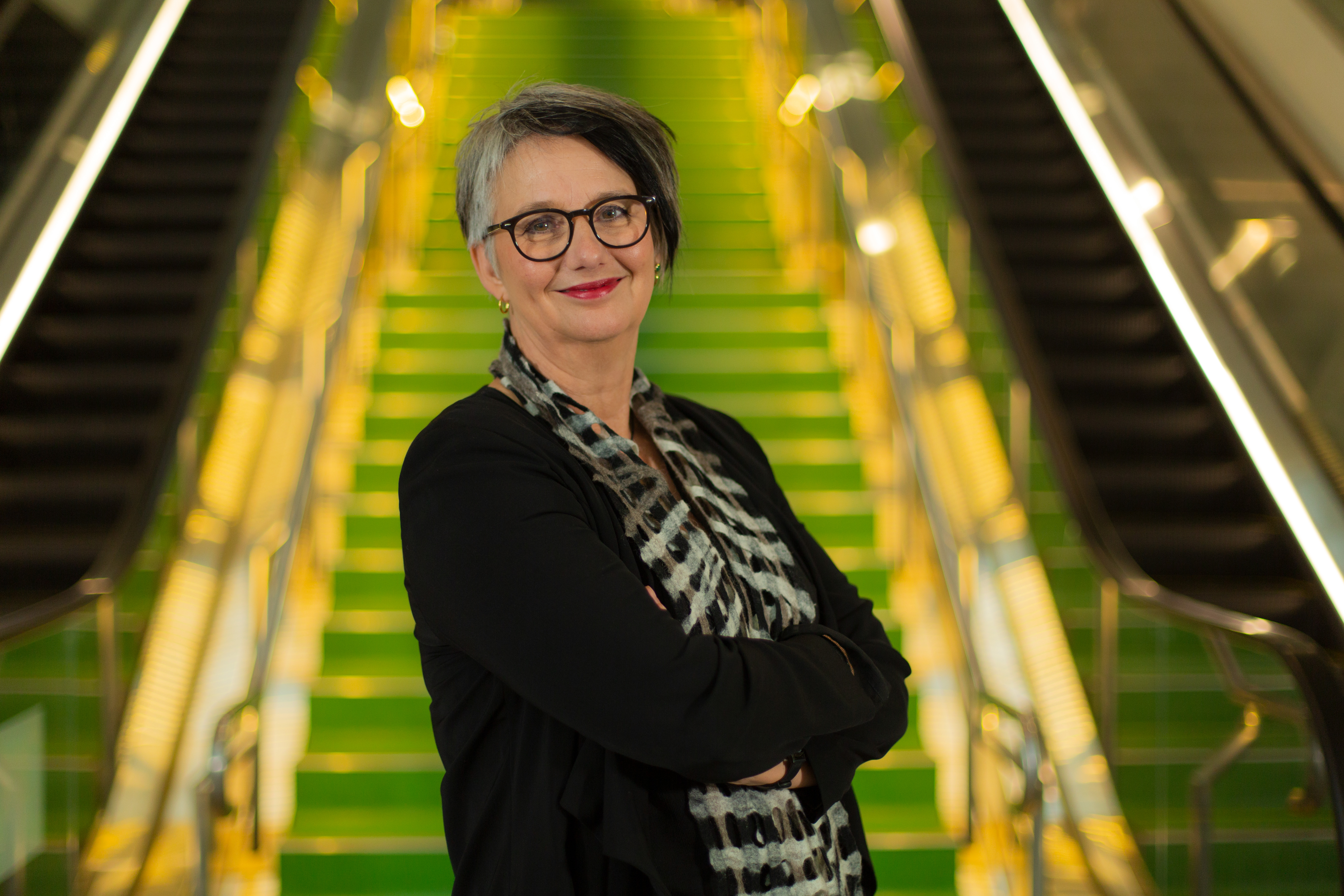Dean Mia Lindgren on ACMI, podcasting and Horizon 2025

Professor Mia Lindgren is the Dean of Social Sciences, Media, Film and Education at Swinburne.
In summary
- Dean of Social Sciences, Media, Film and Education Professor Mia Lindgren worked with ACMI on the 'next gen_now’ exhibition
- In addition to her work as Dean, Professor Lindgren researches podcasting and journalism
- Professor Lindgren feels optimistic about Swinburne and her school achieving the Horizon 2025 strategy
Professor Mia Lindgren, Dean of Social Sciences, Media, Film and Education worked closely with the Australian Centre of the Moving Image (ACMI) on the ‘next gen_now’ exhibit, showing from 7-13 August. As well as being a Dean, Professor Lindgren is an active researcher with a keen interest in podcast journalism.
She shares her excitement about the ACMI partnership, as well as her latest research and her work to support the Horizon 2025 vision and strategy.
What are you currently researching?
My research examines the intersection between journalistic storytelling and health, recently focusing on podcast journalism. I’m interested in how audio stories and formats, such as in podcasting, can overcome some of the barriers to journalism by creating connection and engagement with audiences through authentic and transparent storytelling.
What do you like about working at Swinburne?
The size of the university naturally encourages collaboration across disciplinary boundaries. I’ve got great colleagues! There’s a strong sense of collegiality and enjoyment in working together. We also have such inspiring students who have found their stride at Swinburne, thriving in a smaller university where they can make meaningful connections.

Professor Lindgren started her career as a journalist. Now she researches the role of podcasting in the world of journalism.
Swinburne has been ACMI’s Major Academic Partner since 2019. Professor Lindgren has been a driving force behind the partnership.
Why is this partnership so significant?
The partnership with ACMI reinforces Swinburne’s position as a leader in creation of digital media. We proudly house the Centre for Transformative Media Technologies in the school, where researchers explore how media technologies impact our lives through cultural, artistic and socio-technological research. A partnership between Swinburne and ACMI supports that work. It’s a good example of a formalised relationship between a national cultural icon and an academic institution that supports development of transformative research and opportunities for our students.
What excites you about Swinburne’s partnership with ACMI?
The partnership has sprouted several creative collaborations and supported research projects funded by the Australian Research Council. Swinburne students work on ACMI projects and gain important experiences of work. Equally important, our clever students bring their expertise to inform and influence the way ACMI develops exhibitions and shares knowledge about screen cultures, interactive games, virtual reality, laser art and more.
From 7–13 August, ACMI and Swinburne will present the ‘next gen_now’ program – a celebration of digital media that uses cutting-edge technology to immerse visitors in new worlds.
What would you tell your friends and family to see first?
In a different part of my life, I worked on the Svalbard Islands in the Artic, so I’m personally looking forward to our colleague Dr John McCormack’s ‘Aurora Australis Ultimo Choro’ exhibit, which takes us to the great southern continent. It brings to life the last grand Antarctic voyage of the Aurora Australis, using VR technology to invite us onboard to join the crew and the Antarctica expeditioners. It demonstrates the power of digital media storytelling and how VR technology can let us share experiences from afar.
How does your role support Swinburne’s new Horizon 2025 strategy?
As a dean, I work with staff on connecting our teaching and research with the Horizon 2025 strategy. Much of what we do already fits under the broad banner of ‘people and technology working together for a better world’. For academics in the fields of Social Sciences, Humanities, Arts, Media, Film and Education, our focus is on understanding humans, cultures and societies. In a contemporary world, that includes exploring human interaction with technology - just imagine life without smartphones! Horizon 2025 allows us to showcase the core role of research and teaching focused on the lives of humans in all aspects of society.
Following the latest advice from the Victorian Government, ACMI will be temporarily closed from Friday 6 August. Unfortunately, next gen_now is postponed.
Swinburne and ACMI look forward to rescheduling this event showcasing exciting digital experiences, films, games and art. Check the ACMI website for updates.
-
Media Enquiries
Related articles
-

- Technology
- Science
- Engineering
Victorian students drive green energy transition through international hydrogen competition
Swinburne’s KIOSC, in collaboration with Horizon Educational and Gippsland Tech School, co-hosted the Hydrogen Grand Prix in Melbourne.Friday 26 July 2024 -

- University
The future of fashion: Swinburne launches groundbreaking tech-focused fashion course
Swinburne University of Technology is fusing high tech and high fashion to launch a new forward-thinking Bachelor of Design (Fashion).
Thursday 25 July 2024 -

- University
Swinburne achieves first Cygnet Award through SAGE Athena Swan program
Swinburne has achieved its first Science in Australia Gender Equity (SAGE) Athena Swan Cygnet Award.
Monday 01 July 2024 -

- Technology
- Health
New MedTechVic prototypes to transform everyday lives of people with a disability
Swinburne’s MedTechVic has revealed three new prototypes designed through the joint Health-led Manufacturing Innovation Program, in partnership with the Australian Medtech Manufacturing Centre and Safer Care Victoria
Friday 19 July 2024 -

- University
Future of National Institute of Circus Arts (NICA) secured
NICA will transition from Swinburne to the Australian College of the Arts (Collarts), as part of a new agreement that secures the future of circus arts in Australia.
Monday 22 July 2024

